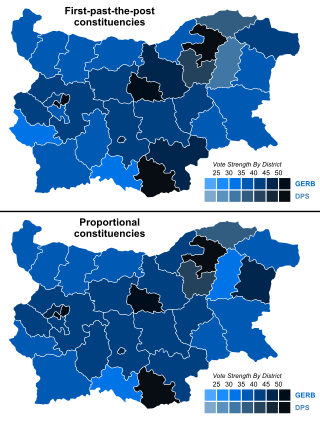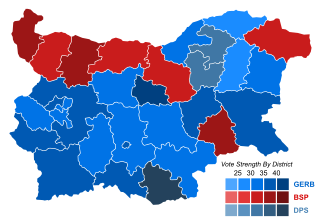| |||||
| Decades: | |||||
|---|---|---|---|---|---|
| See also: | |||||
Events in the year 2010 in Bulgaria .
| |||||
| Decades: | |||||
|---|---|---|---|---|---|
| See also: | |||||
Events in the year 2010 in Bulgaria .

The politics of Bulgaria take place in a framework of a parliamentary representative democratic republic, whereby the prime minister is the head of government, and of a multi-party system. Executive power is exercised by the government. Legislative power is vested in both the government and the National Assembly. The Judiciary is independent of the executive and the legislature.
The history of Bulgaria from 1990 to the present is the period of Bulgarian history that begins after the fall of Communism and the transition to a market economy.

Bulgaria–Russia relations are the diplomatic relations between the countries of Bulgaria and Russia.

Parliamentary elections were held in Bulgaria on 5 July 2009. With 40% of the vote, the decisive winner of the elections was the established in 2006 personalistic party of Boyko Borisov, GERB. The Socialist Party, in power before the election, was in second place, with around 18%. Оnce-ruling National Movement Simeon II did not cross the 4% threshold and won no seats. The turnout was 60.6%, one of the lowest ever. Following the election, GERB leader Boyko Borisov became Prime Minister. Just like all the previous parliamentary elections since the fall of communism, the government was not re-elected.

Rosen Asenov Plevneliev is a Bulgarian politician who was the 4th President of Bulgaria, holding the position from January 2012 to January 2017. He was the Minister of Regional Development and Public Works from July 2009 to September 2011 as part of the cabinet of Boyko Borisov. In October 2011, Plevneliev was elected as President in a second round of voting; he was inaugurated on 18 January 2012.

Marin Raykov Nikolov is a Bulgarian politician and diplomat who was appointed to serve as a caretaker Prime Minister of Bulgaria and minister of foreign affairs of Bulgaria on 12 March 2013 by Bulgarian president Rosen Plevneliev. He left office on 29 May 2013 with his interim deputy PM Ekaterina Zakharieva.

Boyko Metodiev Borisov is a Bulgarian politician who served as the prime minister of Bulgaria from 2009 to 2013, 2014 to 2017, and 2017 to 2021, making him Bulgaria's second-longest serving prime minister to date.

Krasimir Donchev Karakachanov is a Bulgarian politician. He has been the leader of the IMRO – Bulgarian National Movement since 1991.

The Reformist Bloc was a centre-right electoral alliance in Bulgaria.

Radan Milenov Kanev is a Bulgarian politician who was elected as a Member of the European Parliament from Bulgaria in the 2019 European Parliament election. He used to be one of the leading members of the Reformist Bloc.

The ninety-fourth Cabinet of Bulgaria took office on November 7, 2014. It was a coalition government chaired by Boyko Borisov. The government was formed after Borisov's party, GERB, won the 2014 parliamentary election. As GERB won 84 out of the 240 seats in the National Assembly, they were compelled to form a coalition to legally govern.

Parliamentary elections were held in Bulgaria on 26 March 2017. They had originally been scheduled for 2018 at the end of the four-year term of the National Assembly. However, following the resignation of Prime Minister Boyko Borisov and the failure of Bulgarian parties to form a government, early elections were called. Borisov resigned following the defeat of Tsetska Tsacheva, the candidate of his GERB party, in the November 2016 presidential elections. The official election campaign began on 24 February.

Lilyana Pavlova Nikolova is a Bulgarian politician from the GERB party who served as Minister of Regional Development and Public Works in Boyko Borisov's first and second cabinet and as Minister of Bulgaria's Presidency of the Council of the European Union in Borisov's third cabinet.
Events in the year 2018 in Bulgaria.
Events in the year 2019 in Bulgaria.
Events in the year 2020 in Bulgaria.

Republicans for Bulgaria is a Bulgarian political party formed as a split from GERB by Tsvetan Tsvetanov, formerly the second most senior official in the ruling GERB party, after he was demoted from his positions by GERB leader and Bulgarian Prime Minister Boyko Borisov. The party's abbreviation (RB) is an allusion to the defunct rightist Reformist Bloc coalition.
Bulgaria–Palestine relations are the bilateral relations between Bulgaria and Palestine. Diplomatic relations were established in February 1973. Both countries are members of the Union for the Mediterranean. Bulgaria recognized the Palestinian Declaration of Independence issued by the Palestine Liberation Organization (PLO).
Events in the year 2023 in Bulgaria.